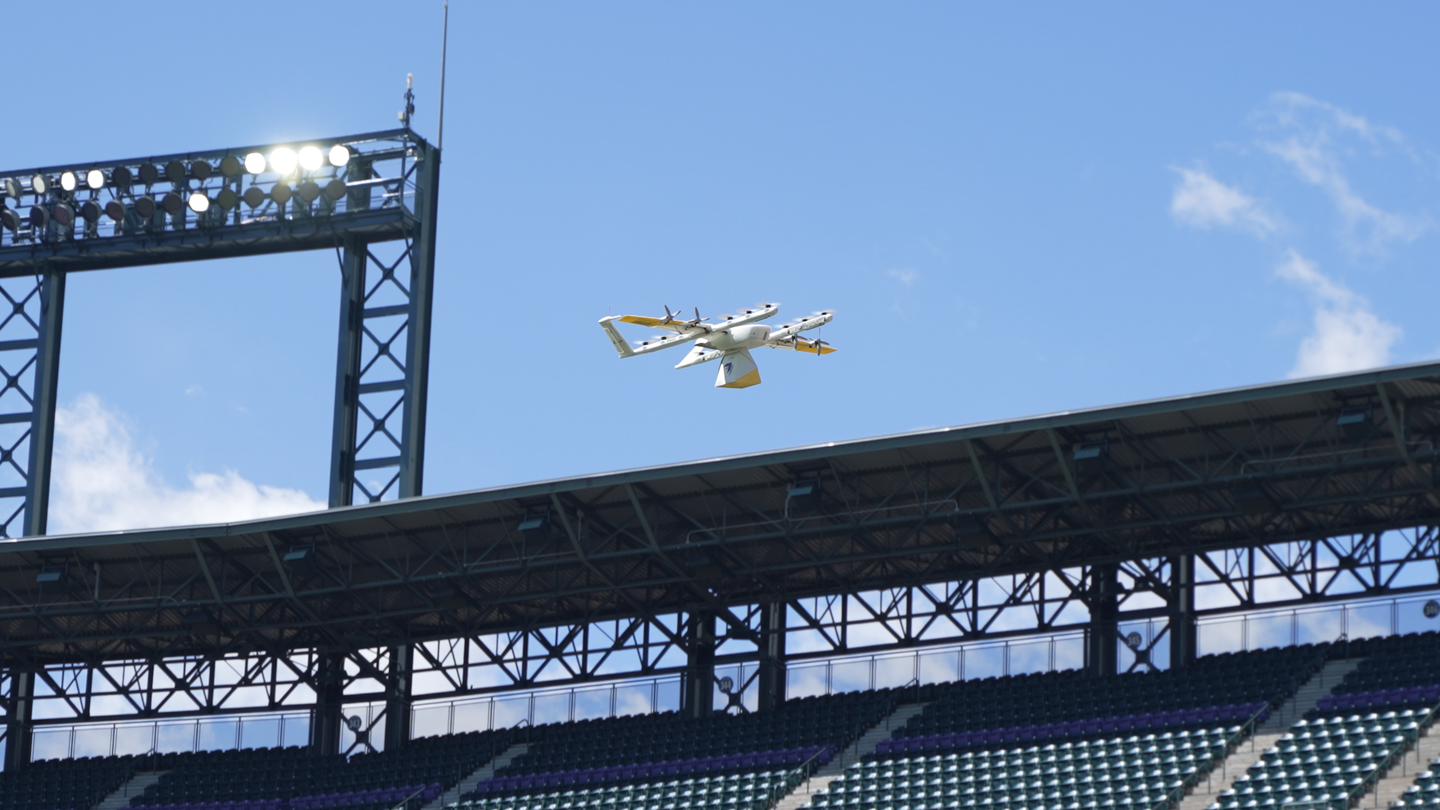Watch a Google drone deliver beer and snacks to Denver’s Coors Field
It might never match the pace and precision of a human vendor, but it's still a cool demonstration.

Wing, Google parent company Alphabet’s drone-delivery subsidiary, pulled off a fun demonstration delivery earlier this month: one of its drones delivered beer and peanuts to Coors Field, the Colorado Rockies’ stadium in the middle of Denver. While this novel first comes with a heavy dose of caveats, it still gives a nice glimpse of how far some drone delivery operations have come over the past few years.
What are the caveats? According to Wing, the drone delivered a small package of beer (“Coors of course”) and peanuts to the outfield area of Coors Field during the opening party for the Association of Unmanned Vehicle Systems International’s (AIVSI) annual autonomous systems conference. There were apparently 1,000 people in the stands, though as you can see in the video, it was no game day crowd. Crucially, Wing wasn’t using its drones to deliver beers and peanuts on demand—this was purely a demonstration flight to show the drone operating in a downtown urban environment.
“Our drones will never match the experience of flagging down a vendor and having them toss peanuts to you from 20 seats away. Nor do we think delivering during game day is a particularly compelling use-case for our technology,” writes Jonathan Bass, Wing’s head of marketing and communications in the blog post announcing the feat. “We’re more focused on supplementing existing methods of ground-based delivery to move small packages more efficiently across miles, not feet.”
And Coors Field was a suitable environment to show just how capable its drones have become. Over the past few years, the former moonshot has progressed from delivering to rural farms and lightly populated suburbs to flying packages around denser suburbs and large metro areas like Dallas-Forth Worth in Texas. As Bass explains it, despite Wing having done 1,000 deliveries on some days in one of its Australian bases of operations, the company is still regularly asked if drone delivery could work in “dense, urban environments”.
“We chose Coors Field because it’s a particularly challenging environment,” writes Bass. “Coors Field sits in the middle of Denver, Colorado—one of the fastest growing cities in America. Any professional sports stadium—with stadium seating, jumbotrons, and the like—makes for a fun challenge.”
The demonstration is all part of Wing’s plans to massively expand where it operates over the next while. Earlier this year, it announced the Wing Delivery Network. Drones in this program would work more like ride-sharing vehicles that picked up and dropped off packages as needed instead of operating from a single store or base. To make this possible, Wing unveiled a device called the AutoLoader. It sits in a parking spot outside a store and enables to staff to leave a package for a drone to autonomously collect.
While things seem to be taking off for Wing, the scene is a bit more turbulent across the drone delivery industry. In particular, Amazon’s Prime Air is really struggling to launch. Despite first being unveiled almost a decade ago, Prime Air has now completed a total of “100 deliveries in two small US markets,” according to a report earlier this month by CNBC. The company apparently intended to reach 10,000 deliveries this year, but has had to revise those projections. It probably doesn’t help that a significant number of workers were laid off earlier this year.
Other companies are having more success. Zipline, best known for delivering medical supplies by parachute in rural Africa from catapult-launched fixed-wing drones, recently showcased a new platform that would allow it to deliver more typical packages—like a Sweetgreen salad—by lowering them on a tether from a hover-capable drone. It, along with DroneUp and Flytrex, have partnered with Walmart and collectively completed more than 6,000 deliveries last year. The big question consumers have: Are delivery drones going to be everywhere in the next few years? Probably not, but they are likely to be more present.
Watch the drone in action below:
